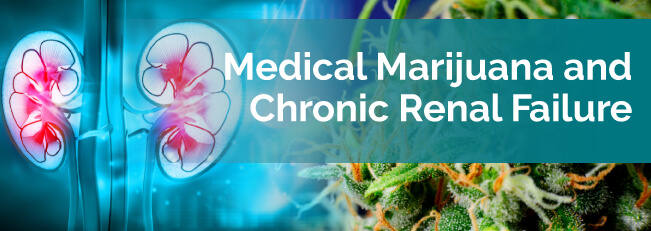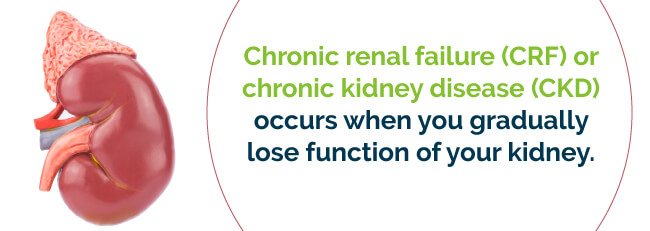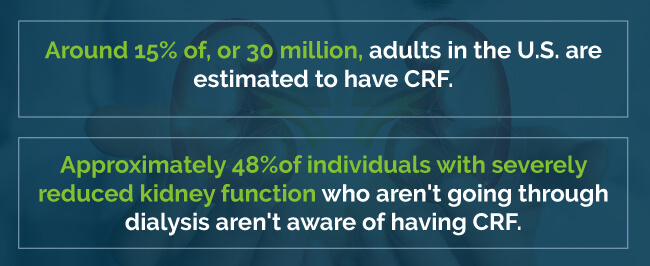
If you’ve just started dialysis due to your chronic renal failure, instead of taking anxiety medications and painkillers to ward off the common and often debilitating side effects, you may want to consider medical marijuana for chronic renal failure.
Medical-grade marijuana helps with managing pain. However, there’s still been debating beliefs as to whether or not cannabis harms or helps the kidneys. But the claims that cannabis does injure your kidneys typically points to the smoking of the herb that’s the damaging factor and not the other methods of consumption like using tinctures or vapors or infusing the herb into your food.
According to a joint study by the University of Alberta and the University of Calgary, small symptom improvement by using CBD and THC — both cannabinoids in marijuana — in patients who have difficult-to-treat symptoms can be meaningful clinically.

Many patients who have chronic illnesses in their advanced stages experience significant symptom burden related not only to the illness in itself, but also the treatment side effects. Some patients who are not responding well to traditional treatments for pain and other symptom management could very well benefit from cannabis.
Cannabinoids act on your body in various ways, and often how they work is not entirely understood. However, in theory, when it comes to problems involving your kidneys, marijuana for chronic renal failure could work well, particularly when high drug loads add even more pressure to your kidneys.
Two primary ways marijuana can be an effective treatment for chronic renal failure are:
It’s here medical cannabis for chronic renal failure may help these patients.
Cannabis has many compounds in it, many with positive effects. You have an endocannabinoid system in your body, and activating this system when you’re nauseous or are in pain to relieve symptoms is where marijuana comes into play.
Of course, there’s still much to learn. But in the meantime, a reasonable option for many CRF patients is medical weed.
Find A Doctor Find A Dispensary
Your kidneys work by cleaning your blood, getting rid of excess minerals, fluid and waste. Your kidneys also make hormones to keep your blood healthy and your bones strong. Chronic kidney disease attacks the nephrons, causing damage. This damage can leave your kidneys in a state where they can’t eliminate waste. Medications, genetic problems, injuries and illness can lead to CRF.
Thankfully, there’s an abundance of new scientific research and understanding of how cannabis and chronic renal failure treatment can be beneficial. Most CRF patients, particularly patients who are on dialysis, are seeking ways to relieve their stress, chronic pain, loss of appetite, nausea, insomnia, anxiety and more.
You have a variety of strains of medical cannabis for chronic renal failure to choose from to help ease your symptoms. In fact, you can treat most of the symptoms with cannabis to help improve your quality of life. Below are some helpful strains to treat the symptoms of kidney disease.
Nausea and Vomiting
Loss of Appetite
Fatigue and Weakness
Sleep Problems
Muscle Twitches and Cramps
Swelling of Feet and Ankles
There are various ways you can treat your chronic renal failure with medical cannabis. Some methods include:
You can add medical pot to just about anything, particularly if you first infuse it into oil, glycerin or butter. From THC chocolate bars or vegan, gluten-free THC bacon strips to strain-specific caramels to lozenges, you’ll find endless recipes.

You may buy or fill tincture dropper bottles with infused glycerin, alcohol or vegetable oil with high CBD content and drop it under your tongue.
Vaporizing the flower lets you use more cannabinoids and get a better taste of the terpenes without having to burn the plant. It also creates leftover vaped material you can use for cooking.
If you live in a state allowing medical cannabis dispensaries, you could buy a topical marijuana solution. Or you may even want to mix up your cannabis oil with some light coconut oil or almond oil, aloe vera or beeswax.
You may be able to get a nephrologist’s recommendation for a medical marijuana card if you’re on dialysis and are suffering from some or all of the mentioned symptoms above. Search for a medical marijuana dispensary or cannabis doctor today on our website.
Find A Doctor Find A Dispensary
Chronic renal failure (CRF) or chronic kidney disease (CKD) occurs when you gradually lose function of your kidney. Your kidneys are responsible for filtering excess fluids and waste from your blood, which then excretes into your urine. When you reach an advanced stage of chronic renal failure, dangerous levels of electrolytes, fluid and waste may build up in your body.

When you’re in the earlier stages of kidney disease, you may only have a few symptoms since the condition often doesn’t become apparent until the functioning of your kidneys is significantly impaired.
Chronic renal failure treatment works by slowing kidney damage progression, typically by keeping the underlying cause under control. Chronic kidney disease may, however, progress to end-stage kidney failure, which, if you don’t have a kidney transplant or dialysis, can be fatal.
Classification of chronic renal failure depends on its primary damage location.
Your type of chronic renal disease can be acute or chronic. Acute may occur due to direct kidney trauma, from an accident or injury for example. Chronic kidney disease occurs over extended period and involves long-term damage.
The first patient began chronic renal failure treatment through repetitive hemodialysis (HD) in March 1960 at the University of Washington Hospital in Seattle. Over 30 years have elapsed since legislation was passed by the U.S. Congress to create the Medicare End-Stage Renal Disease Program.
Today, many nephrologists aren’t familiar with the history of these political and clinical developments that led to the dialysis treatment we know today.
Symptoms and signs of CRF develop gradually if your kidney damage has a slow progression.
CRF symptoms are many times nonspecific, which means other illnesses can cause them. Since your kidneys can compensate for lost function and are highly adaptable, your symptoms might not show up until there is irreversible damage.
There are both physical and mental effects of chronic renal failure.
CRF may affect any area of your body. Some possible complications could include:
Patients often go through a continuous psychological process with CRF to adjust to the new hemodialysis condition and accept their new quality of life.
When you reach the point of requiring dialysis, your quality of life is significantly affected since you’ll have significant changes in your lifestyle and daily habits. Also, your functional status, physical health, economic and social status and personal relationships are also greatly affected.
Another common psychological complication with CRF is depression and its severe impact on the hemodialysis patient’s quality of life. Depression also negatively affects your economic, social and psychological well-being.
Medical marijuana can help with some of the physical effects of chronic renal failure, such as nausea and vomiting, and mental effects of anxiety, major depression and chronic fatigue.
Statistics from the Centers for Disease Control and Prevention (CDC) show:

Treatments for end-stage renal disease are a kidney transplant or dialysis — ideally only until a kidney transplant is available. In certain situations, medications and lifestyle changes can help.
Surgery for a kidney transplant involves the surgeon removing your damaged kidneys and inserting a donated, functional kidney. All you need is one healthy kidney — therefore, donors are typically alive, though in some cases, you can obtain a viable kidney from a recently deceased person. They’re able to continue functioning normally after donating one of their kidneys.
You can live a healthy life with one kidney but will need to take immunosuppressive drugs most likely for the remainder of your life to prevent rejection.
You have a couple of options available to you when you’re undergoing dialysis.
1. Hemodialysis
This option processes your blood with a machine. This machine uses a solution to filter out waste. The machine then adds new, clean blood back into your body. Hemodialysis is typically used several times a week and takes around three to four hours each session.
2. Peritoneal Dialysis
This option involves the doctor adding a solution into your abdomen. They then remove it later through the use of a catheter. You can conduct peritoneal dialysis at your home with sufficient training. You can have this treatment while you’re sleeping overnight.
Dialysis also a time-consuming process and requires you to visit a hospital or dialysis clinic multiple times a week.
If you have hypertension or diabetes, you’ll need to control either of these conditions to lower your risk of end-stage renal disease. Drug therapy is beneficial for both of these conditions using ACE inhibitors (angiotensin-converting enzyme inhibitors) or ARBs (angiotensin receptor blockers).
Your doctor can give you specific vaccines to help to prevent severe end-stage kidney disease (ESRD) complications. The pneumococcal polysaccharide (PPSV23) and hepatitis B vaccines may lead to a positive prognosis, according to the CDC — particularly before and during your dialysis treatment.
You may experience rapid weight changes with fluid retention. Therefore, you’ll need to monitor your weight. You’ll also want to decrease your protein consumption and increase your caloric intake. Consume a diet low in potassium, sodium and other electrolytes, along with fluid restriction.
To avoid too much potassium and sodium consumption, limit these foods:
Take a vitamin supplement of vitamins C and D, calcium and iron to absorb essential nutrients and help your kidney function.